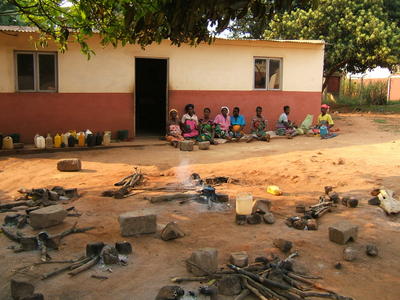In spite of ourselves
There are few more wrenching film scenes than the one in Rabbit Proof Fence when three “half-caste” children are ripped from the arms of their mothers and sent thousands of miles away to a work camp/orphanage as part of a notorious cultural genocide campaign. Kenneth Branagh brilliantly plays the coolly obsessive “Chief Protector of Aborigines” whose goal is to scrub all the black out of Australians via state-controlled selective breeding—better known as slavery and rape. He sees himself in the center of a strange evolutionary struggle between darkness and chaos versus order and light—and casts himself as chief engineer, foreshadowing Hitler’s experiments with eugenics.
The protagonist of the film, one of the stolen children who escapes to return home, shares the same name with my best friend: Molly. Which must mean “clever and tenacious as hell” in some Gaelic or aboriginal tongue.
“We face an uphill battle against the bush natives, who must be protected from themselves. If only they would understand what we’re trying to do, we must help the native in spite of himself” says Chief Protector Neville.
Earlier today in the airport I was pointedly avoiding speaking English so I wouldn’t be associated with a small knot of my fellow countrymen, snorting and joking amongst themselves about "Mozambican time" and the typical lateness of the plane (only about 10 minutes—and not any more typical than late planes anywhere else in the world). I think they were missionaries. As I seethed at their conversation, I considered that maybe I was overreacting, in spite of myself. I don’t think so.
The arrogance betrayed by their comments irks me most, a characteristic shared by so many Americans—the blindness to the faults in our own society accompanied by a commensurate eagerness to pick on others’. Last year I was in Cape Town with a two friends who live in Boston and Kansas. We sat in an upscale restaurant surrounded by the other 95% white clientele and talked about how eerie it was that you could still feel and see the vestiges of Apartheid so strongly. I asked, how is this different from Boston or Kansas or the Westside of Cleveland?
We know all about South African Apartheid, but less about all the other Apartheids and ethnic cleansings and Stolen Generations, from our own particular US brands to England’s Rhodesia to Portugal’s Mozambique to Australia--even lily-white Canada has a few skeletons in the closet. It’s not much comfort to know that selective memory isn’t unique to Americans. A friend of mine was working on a film project about the politics of forgetting in Belgium--the erasure of King Leopold II’s bloody history from their collective consciousness. Leopold was arguably the last century's greatest architect of genocide—up to 15 million Congolese were killed and millions more were enslaved when he turned a huge swath of Africa into a forced labor camp at the dawn of the 20th century. He too hid behind the cover of a humanitarian mission to civilize the savages.
In the New York Times today there are two articles about corruption, one about Kenya and another about Louisiana post-Katrina. The Kenya article’s headline mentions “graft as part of Kenya’s social puzzle” and goes on to say that three cabinet ministers have quit because of the efforts of an anti-corruption czar. The Louisiana article focuses on small-town mayors and city councilmen and makes the problem sound like something confined to those crazy Cajuns. The mainstream media just nibbles at the edges of high-level corruption in our own government (rarely even using the term). On this side of the world, I never hear Europeans or Americans or Africans lamenting the graft of Western governments, while the plague of crooked Africans is such a staple of cocktail party conversation and writing on Africa that the phrase “corrupt African leaders” has become cliché. One question: if Africans are accepting graft and bribes, who is doing the offering? Seems we’re still trying to help the native in spite of himself--and in spite of ourselves as well.
The protagonist of the film, one of the stolen children who escapes to return home, shares the same name with my best friend: Molly. Which must mean “clever and tenacious as hell” in some Gaelic or aboriginal tongue.
“We face an uphill battle against the bush natives, who must be protected from themselves. If only they would understand what we’re trying to do, we must help the native in spite of himself” says Chief Protector Neville.
Earlier today in the airport I was pointedly avoiding speaking English so I wouldn’t be associated with a small knot of my fellow countrymen, snorting and joking amongst themselves about "Mozambican time" and the typical lateness of the plane (only about 10 minutes—and not any more typical than late planes anywhere else in the world). I think they were missionaries. As I seethed at their conversation, I considered that maybe I was overreacting, in spite of myself. I don’t think so.
The arrogance betrayed by their comments irks me most, a characteristic shared by so many Americans—the blindness to the faults in our own society accompanied by a commensurate eagerness to pick on others’. Last year I was in Cape Town with a two friends who live in Boston and Kansas. We sat in an upscale restaurant surrounded by the other 95% white clientele and talked about how eerie it was that you could still feel and see the vestiges of Apartheid so strongly. I asked, how is this different from Boston or Kansas or the Westside of Cleveland?
We know all about South African Apartheid, but less about all the other Apartheids and ethnic cleansings and Stolen Generations, from our own particular US brands to England’s Rhodesia to Portugal’s Mozambique to Australia--even lily-white Canada has a few skeletons in the closet. It’s not much comfort to know that selective memory isn’t unique to Americans. A friend of mine was working on a film project about the politics of forgetting in Belgium--the erasure of King Leopold II’s bloody history from their collective consciousness. Leopold was arguably the last century's greatest architect of genocide—up to 15 million Congolese were killed and millions more were enslaved when he turned a huge swath of Africa into a forced labor camp at the dawn of the 20th century. He too hid behind the cover of a humanitarian mission to civilize the savages.
In the New York Times today there are two articles about corruption, one about Kenya and another about Louisiana post-Katrina. The Kenya article’s headline mentions “graft as part of Kenya’s social puzzle” and goes on to say that three cabinet ministers have quit because of the efforts of an anti-corruption czar. The Louisiana article focuses on small-town mayors and city councilmen and makes the problem sound like something confined to those crazy Cajuns. The mainstream media just nibbles at the edges of high-level corruption in our own government (rarely even using the term). On this side of the world, I never hear Europeans or Americans or Africans lamenting the graft of Western governments, while the plague of crooked Africans is such a staple of cocktail party conversation and writing on Africa that the phrase “corrupt African leaders” has become cliché. One question: if Africans are accepting graft and bribes, who is doing the offering? Seems we’re still trying to help the native in spite of himself--and in spite of ourselves as well.





